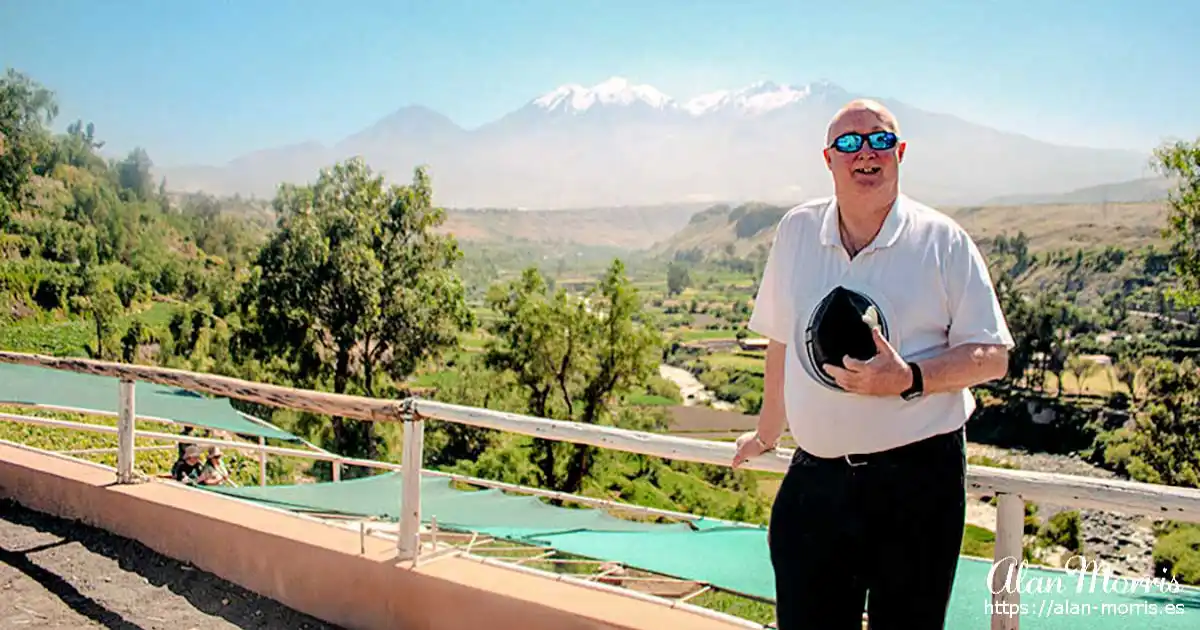This morning, I ate at the breakfast buffet and drank one or two cups of Coca-Cola tea, which I had gotten used to on this trip.
The city of Arequipa lies in the shadows of the ice-capped volcanoes known as 'The Ring Of Fire'. These volcanoes are still active, and one could be seen smoking as we got closer to it.
The coach driver taking us on today's tour of the city weaved through very built-up areas that had small, winding roads. At some stages, it was difficult to see how he would get our coach through the tiny roads of Arequipa, and when he turned onto a dirt track, I thought he had decided he couldn't get through the road he had taken us down and was trying to turn round in a field. The driver did, it seemed, know precisely what he was doing and where he was taking us. We soon came to a broader area that opened up over a beautiful, fertile valley. In the centre of it wound a river, which started in the mountains and volcanoes above us and flowed past us and down through Arequipa.
In the valley, we could see different crops growing and different livestock grazing, both being tended to by the farmers who made their living here. The view up this valley to the 'Misty' volcano above was amazing and such a contrast to the desert we had been travelling through.
Next, we were taken into the town square, where we were dropped off for the walking part of our tour of Arequipa. Our first stop was at the Catholic University Museum. This is the home of the Inca Ice Maiden, Juanita. The frozen remains of an Inca girl who was sacrificed to the Inca gods between 1450 and 1480. She was discovered on Mount Ampato by an anthropologist and is now kept in a frozen state on display with other artefacts from the area. I am not sure how I feel about the body ending up in a glass case in a museum for people to view.
Although I am not a religious person, I still believe her remains deserve better than being preserved for tourists and scientists to ponder on, and I am sure this is not what the Inca people who sacrificed her intended. I am pretty sure that if we could ask her, she would firstly say she would rather have lived and that when she had died of old age, she would have instead been given a more normal burial.
After leaving the museum, we walked to the Santa Catalina Monastery. This large Monastery is more like a small walled village inside Arequipa. Our tour guide told us that the second daughter of a family would go here and receive her religious instruction. She then told us that, different from other convents I have visited, the girls here were generally from well-off families and that the girls here could bring their servants with them to look after them. The practice of bringing your servants was, at some stage, stopped. We were taken around the bakery, kitchen and washrooms where the girls would have to bake, cook and clean for themselves.
I think this is a beautiful, tranquil place, and I could see many people wanting to stay here as a retreat from the dust and noise of the big cities.
The tour finished, and we went back to our hotel, the Casa Andina Classic. On the way, our tour guide Jorge told us that for anyone interested in going, he would walk us to the Vicuna factory for a tour and a bit of retail therapy. I went along, and we walked through some pleasant cobbled streets, where dogs barked at us from the flat roofs of the Spanish-style homes. We soon came out onto the main dusty road through Arequipa, with traffic moving in a haphazard way along it. We were planning our method of attack for our passage across the road when a policeman appeared through the traffic, promptly acted as a school crossing guide and got us safely to the other side.
The Vicuna museum and factory appeared to be large houses from the front, but as we went around the side, we were shown a garden with different types of Llamas, Alpacas and Vicuna. We stopped here and were given a lesson on how to tell different types of animals apart and what the different breeds were used for.
We then went into the factory, where we were shown the different types of wool and got to feel how soft the different varieties were. After learning all about the process and seeing women making blankets by hand, we were then taken through a shop before going back to the hotel. It felt just like a Disney ride. You do the queue, learn something about the ride (the garden and animals), then the ride (the factory) and finally, the souvenir shop (the Vicuna and Alpaca garment store). I ended up purchasing a very expensive blanket for my mum, made from alpaca wool. It should keep her warm in the English winter.
After returning to the hotel, I made my way up to the roof garden, where I got a view of the city around us and the beauty and majesty of the Mountains and Volcanoes that border Arequipa. After a short rest, my stomach reminded me that I hadn't eaten since breakfast, and around 5:30 pm, I set out to find a restaurant called Zig Zag that Rosario, our tour guide, had recommended to me. A short walk later, I found it and had a wonderful meal, a trio of meats which included lamb, pork, and Alpaca (nothing goes to waste with Alpaca; first you take its wool for a lovely jumper, then you eat what's left). After a great meal and a cool beer, I returned to the hotel for an early night and a good night's sleep.
